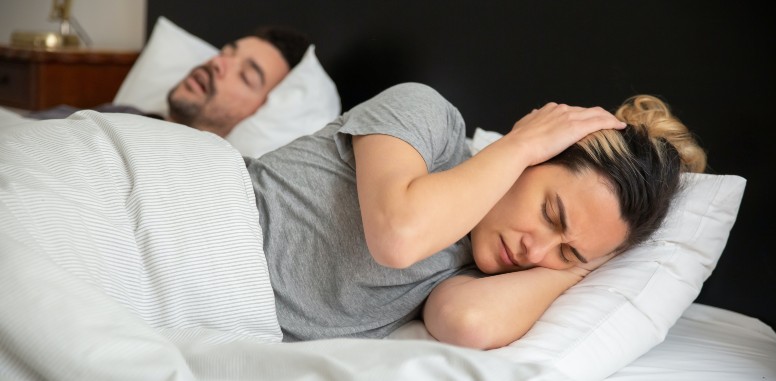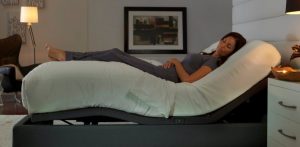The short answer is, yes. Sleeping on your side may lessen or stop your snoring.
However, it doesn’t mean side sleeping is an exact solution for snoring!
People snore due to various reasons, such as the anatomy of the mouth, fat accumulation around the neck, and advancing age [1, 2, 3].
Therefore, depending on the cause, positioning yourself on your side may not make much of a difference.
That said, side sleeping is the most recommended sleep position for those who tend to snore.
In this article, we’ll explain how sleeping on your side may help stop or (at least) reduce your snoring.
Snoring and Sleep Positions
Snoring is a very common problem. It is estimated that around 40 million American adults regularly snore [4, 5].
Undoubtedly, seeing a doctor who specialises in snoring is the most effective and healthiest way to treat this sleep disorder!
You should especially see a doctor if you snore very loudly and wake up tired almost every morning; because these signs may indicate obstructive sleep apnea, a sleep disorder that can have deadly consequences if left untreated [6, 7].
However, if your snoring is mild and occasional, then you may be able to prevent or quiet it with home remedies.
Side sleeping is an easy-to-implement and effective home remedy for snoring, as we mentioned above.
It is important to note that sleeping on your stomach may also ease your snoring! However, stomach sleeping can cause back pain and neck pain, which can lead to poor sleep [8, 9].
How Does Side Sleeping Help With Snoring?
When you sleep on your back, your tongue and surrounding soft tissues drop back toward your throat due to gravity, narrowing your airway. This can obstruct the airflow. When the air is forced through the obstructed area, the soft tissues of the upper airway vibrate and create a sound that we know as snoring [10, 11].
When you sleep on your side, your tongue and soft palate do not collapse back towards your throat and narrow your airway. This in turn helps you breathe smoothly and quietly during sleep.
“Positioning yourself on your side or stomach can help the airways stay open to reduce snoring and alleviate mild apnea,” says Rachel Salas (M.D), an associate professor of neurology at Johns Hopkins Medicine.
As sleeping on your side doesn’t narrow your airways and obstruct your breathing, side sleeping is the most recommended sleep position when it comes to snoring [12, 13].
Plus, sleeping on your side is unlikely to cause back and neck pain, which you might experience when you sleep on your stomach.
What Does the Research Say?
Studies confirm that side sleeping might help individuals stop or reduce their snoring.
In one study, Japanese researchers found that sleeping in the lateral position (side sleeping) reduced the time spent snoring as well as the intensity of snoring in those who snore without sleep apnea.
Some studies have shown that even people with mild sleep apnea can benefit from sleeping on their sides!
Researchers in Israel examined around 2100 sleep apnea patients and found that approximately 55% of them were positional snorers, meaning that they snore only when they sleep on their backs.
An old study revealed that sleep apnea patients who sleep on their sides tend to breathe better through the night.
How to Sleep on your Side
We now know that sleeping on your side may ease snoring. So how can you be a side sleeper, if you are not already?
Research tells us that an adult person changes position an average of 20 times per night during sleep [13, 14, 15].
That means; even if you fall asleep on your side, you can end up sleeping on your back, thus increasing your chance of snoring.
Here are some techniques that can prevent you from sleeping on your back;
- According to HelpGuide: it might be a good idea to attach a tennis ball to the back of a pyjama top or T-shirt. If you subconsciously roll over onto your back during sleep, the discomfort of the tennis ball will cause you to shift over to your sides.
- Alternatively, you may purchase special pillows or vibrating devices which prevent you from rolling over onto your back.
Additional Tips to Reduce Snoring
In addition to sleeping on your side, the below-given tips might ease your snoring.
- Limit or avoid alcohol close to bedtime,
- If you smoke, try to quit,
- If you are overweight lose weight,
- Drink enough fluid during the day,
- Invest in a humidifier to keep the air in your room moist,
- Get enough sleep (7- 9 hours enough for most adults),
- Consider elevating your head while you sleep,
- Sleeping pills may cause or worsen snoring. Talk to your doctor about it.
The Bottom Line
It is safe to say that sleeping on your side — instead of sleeping on your back — may help you stop or reduce your snoring.
That is because when sleeping on your side soft tissues of the upper airway don’t block the airflow. And, this significantly reduces the risk of snoring.
Please note that even those who normally don’t snore can snore when they sleep on their backs. They are called positional snorers since they snore only in the supine position.
Simply put, many people can prevent snoring by simply sleeping on their sides.
What is more, if you sleep on your left you can also avoid nighttime heartburn.
Considerations
Please note that sleeping on your side or other home remedies is no substitute for proper medical treatment!
You may have obstructive sleep apnea if you/your:
- snore in all sleep positions
- almost always wake up tired
- snoring is severe and very loud
- snore consistently
- experience morning headaches
- wake up with a dry mouth
Consult with your doctor, if you think you have sleep apnea!
As mentioned above, if left untreated, sleep apnea can lead to serious consequences, including hypertension, stroke, type 2 diabetes and heart attacks.
Tarkan is an experienced health writer ( currently more than 600 articles ) and also the founder of this website namely www.neededforhealth.com. His expertise in health stems from in-depth medical research and knowledge which he obtained over the course of many years.
Tarkan enjoys sharing factual knowledge on health, psychology and nutrition. He always aims to deliver evidence-based recommendations, provide links to related scientific studies.
tarkanivgen41@gmail.com





